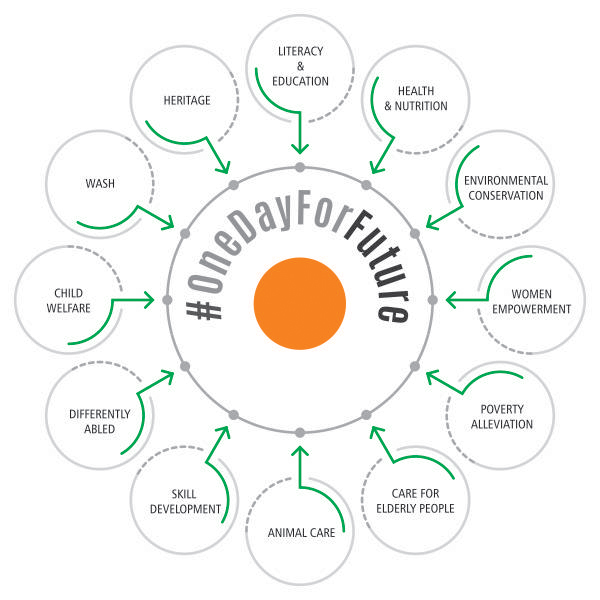Use your power to make a difference by joining our Let's Do Good initiative.
Why Do You Need An Expert Team for Fund Mobilizing & Corporate Collaboration?
Wednesday , 05 May 2021- 5 min. read
Adaptability is a key competitive advantage in today's business environment, and organizations of all types (e.g: startups, nonprofits, social enterprises, and large corporations) require the ability to acquire resources and develop strategic allies. Fund mobilization (the act of raising, diversifying, and managing financial resources) and corporate collaboration (the partnership for mutual growth) are two of the most important and interrelated skills.
Though both fund mobilization and corporate collaboration are mission critical, many organizations struggle in these areas or fail to extract their full potential. All too often, it is due to a lack of capacity on the part of the organization. There is so much more to fund mobilizing and building strategic partnerships than just "raising money" and "coming together." They demand specialization, complexity of strategy, and breadth of trusted networks, which in turn require a diverse and willing group of experts working together.
But why are these activities so complicated? Why aren't well-intentioned generalists enough? In this blog, we will examine in detail why you need an expert team leading your resource mobilization and collaboration.
The Emerging Landscape of Fundraising and Corporate Partnerships
Familiar Terrain
For several decades, organizations (particularly nonprofits and start-ups) used a very limited range of funding options: grants, donations, or bank loans. Corporate partnerships were often informal and limited to marketing budgets or short-term project expenses.
As of today, we have entered a fundamentally different landscape:
- Funding sources have evolved and multiplied: for example, traditional funding sources such as venture capital, angel investing, and impact investors, as well as emerging funding models, including government funding programs, corporate social responsibility (CSR) contributions, crowdfunding, blended finance, and social impact bonds.
- Corporate alliances have changed to go beyond sponsorships to co-developed products and programs and multi-sector networks and lasting major associations.
- Regulators, donors, as well as the common people, are putting more emphasis on scrutinizing the actions of organizations. So, organizations can no longer operate in the shadows, and transparency is unavoidable.
Volatility dictates that one needs a multidisciplinary team of professionals, which will act as a shield and cushion against missed opportunities and errors.
What’s at Stake?
1. Increased impacts
The right capital injection, or the right partnership, can ultimately translate into organizations scaling their missions, reaching new markets, or deploying innovations quickly. The right funding can be the difference between an organization succeeding in one fundraising campaign or one partnership deal for multiple years of growth. But that execution matters exceedingly.
2. The Risks of Misfire
In contrast, a poorly structured deal, fund-raising that is not compliant, or a poorly aligned partner can lead to:
- Resource Loss: wasted money, wasted time, loss of reputation
- Legal Risk: penalties, sanctions, blacklisting
- Distraction from your strategy: loss of focus, confusion internally, dilution of mission
- Lost Opportunities: being overtaken by competitors
3. More sophisticated expectations
Investors and partners are becoming more sophisticated. They will expect:
- Thorough due diligence
- Clear impact metrics and reporting
- High ethical norms
- Alignment of mission, values and culture
Each of these expectations will require a level of expertise that is best provided by professionals.
The Core Benefits of an Expert Team
1. Multi-Disciplinary Depth
Expert teams are specifically designed to offer depth of knowledge from a variety of disciplines:
- Finance: investment structuring, risk analysis, forecasting, cash flow modeling
- Legal: agreements and contracts, compliance, intellectual property
- Strategy: business modelling, go-to-market strategies, partnership mapping
- Communication: stakeholder engagement, crisis public relations, brand identity
- Operations and Technology: implementation, due diligence, monitoring
When working together, this diversity of experience and knowledge ensures that every position will be considered from each perspective, reducing blind spots and increasing the chances of a successful outcome.
2. Experience with Actual Playbooks
Experts have "seen it," gleaning experiences from millions of campaigns and partnerships:
- They know which tools work in which context.
- They spot signals and red flags and their experience will inform management of corporate relationships.
- They build templates, processes, and agreements that can be adapted and used quickly.
3. Access to a Large Established Trusted Network
Fundraising is mostly about who you know, and an expert team usually has:
- Connections to the decision-makers: investors, foundations, sector leaders.
- Knowledge of the intermediaries - the lawyers, PR, and compliance consultants, that need to be on the bus.
- Community goodwill - they know how to open doors and generate goodwill and trust
4. Advanced Analytical & Negotiating Skills
There are always trade-offs, stakeholder interests, and the threat of hidden risks in any deal. Experts:
- Conduct scenario analyses and financial modeling and test outcomes.
- Negotiate an agreement that reflects on the best terms and maintains goodwill.
- Establish impact measurement and feedback loop mechanisms for accountability and oversight.
5. Risk Avoidance & Crisis Management
In addition to creating the most gain for the application of time, money, and relationship energy, experts are very good at:
- Spotting legal and reputational risks early.
- Creating contingency plans for delays, shortfalls, or disagreements.
- Managing the inevitable crisis, from regulatory review to irreconcilable differences within partnerships, with the smallest reputational fallout.
The Fund Mobilization Process: Where Experts Add Value
Let’s break down the fund mobilization journey and highlight where expertise matters most:
1. Opportunity Assessment
What’s required: Deep understanding of market conditions, investors' appetite, and the readiness of your organization.
Expert who does what: Works on business analyses, benchmarks the competition, and creates achievable financial objectives.
2. Value Proposition Development
What’s required: Clear, data-related and compelling outreach specific to each type of audience.
Expert who does what: Develops pitch decks, financial models, projected outcomes, and messaging that resonates.
3. Mapping and Engaging Funders
What’s required: Identify potential funders that are aligned in mission, risk tolerance, and expected returns.
Expert who does what: Activates warm leads, customizes approaches, utilizes door-opening introductions, and minimizes cold call fatigue.
4. Due Diligence
What’s required: Openness, accuracy and anticipating what information funders will be requesting.
Expert who does what: Gathers, lays out, and presents documents, answers compliance questions before they become deal breakers.
5. Negotiation and Closing
What’s required: Strategy, patience and the understanding of everything that goes into structuring deals from convertible notes to revenue-share agreements.
Expert who does what: Fights for terms that balance mission with sustainability – and avoids “shark” investors or unrealistic performance clauses.
6. Compliance and Stewardship
What is considered: Compliance with reporting, legal structures, and managing relationships with funders
An expert's role: Establish tracking mechanisms, impact reporting systems and post-investment communication.
The art and science of corporate collaboration
Creating effective corporate partnerships goes beyond handshake agreements and logo-sharing.
Key Elements of Expert Group Collaboration
- Strategic Fit: The expert needs to explore corporate culture, goals and risk tolerance to scope the fit.
- Value Co-Creation: The expert needs to ascertain how the pie will not only be divided, but how the pie will be made and increased
- Legal and IP Considerations: Protection of sensitive information, IP rights and future-proofing the agreement
- Communication Plans: Public launch strategy, stakeholders and crisis planning
- Joint Measurement and Reporting: Joint KPI development, monitoring systems and learning agenda.
The Real Horror Stories of Collaboration
Many worthy collaborative efforts failed (often spectacularly) because expertise was not deployed:
- Corporations with mismatched cultures imploded as partners.
- Ambiguous clauses in contracts led to expensive lawsuits.
- Failure to anticipate regulatory barriers added stress to innovating compliant, joint products.
In all cases, the lack of an expert team—legal, financial, communications, operational—results in risk and loss of opportunity.
Why Generalists or In-house Teams Are Not Enough
Some may wonder: if these activities can be done by a committed founder, board, or in-house finance team?
Sometimes partially, but rarely at the scale and sophistication necessary for ongoing achievement. Here is why:
- Time & Bandwidth: Internal teams are often doing too many things and responding to too much urgency of daily operations.
- Speed of Market: External practitioners are deeply knowledgeable about relevant sector dynamics; internal teams are often able to glean basic information about industry technologies and practices only “behind the fence."
- Negotiation Skills: Experienced fundraisers and partnership brokers negotiate from a place of being deep and current in the sector—your in-house team may not be so informed.
- Reputation & Trust: Third-party consultants often have neutral and professional reputations, creating confidence with partners or investors.
When to Bring in Expert Teams
Part of leadership is knowing when (and why) to access outside expertise. Some typical triggers are:
- Scale: Planning to or wanting to grow geographically or into new markets.
- Funding: Looking to raise venture capital, work with an impact fund, or try crowdfunding for the first time.
- Strategic Shift: Planning to enter a new sector, launch a new product, or a shift in the organization’s mission.
- Complex Collaboration: Planning a joint venture, merger, or large series of organizations to collaborate.
The earlier you bring in well-matched experts, the greater your odds of smooth, successful execution.
The Potential of Hybrid Teams: Blending Experts with Insiders
The best organizations do not only hire external consultants. The best organizations build hybrid teams, bringing together the knowledge of the organization (as provided by long-term staff and leaders) and the expertise of external consultants.
How This Works
- Strategic Direction: Experts can work with insiders to define the goals and strategic direction.
- Upskilling: Knowledge transfer and training will allow your internal team members to develop their own expertise.
- Sustainability: After the conclusion of the campaign/project, your internal team retains the tools, frameworks, and relationships to move forward.
Case Studies: Expertise Making the Difference
1. Nonprofit Organizing Across Borders
One of the leading healthcare nonprofits wanted to expand from India into Southeast Asia. Initial outreach to donors was unsuccessful. After engaging a specialized fund mobilization firm with knowledge of the local context, the team's approach included:
Identifying co-investors committed to effecting the same changes, who could support with country-specific compliance.
Creating a pitch with the proper focus and compelling local case studies, identified the areas where joint investable income could be derived from personal stories.
Result: Raised $12 million in 10 months (initially projected 18 months) with three additional strategic partners.
2. Corporate-Coalition for Climate Action
A consortium of tech companies aimed to form a consortium around green supply chains. Initial discussions were stalled over anti-trust issues and defining boundaries.
By including legal advisors and seasoned facilitators, the group established a solid governance model.
Building clear protocols around transparent IP-sharing and joint reporting.
Outcome: The coalition was formed without regulatory hurdles and is viewed as a case study for other industry coalitions.
Measuring ROI on Expertise
How do you determine if it was worth spending on fund mobilization or collaboration experts? By considering whether you received:
- Shorter timelines from idea to funding/partnership
- Greater size and quality of funds or deals
- Less failure rate or dropped collaborations
- Reduced legal/reputational risk
- Transference of knowledge to internal teams for future independence.
Money spent on expertise is negligible compared to the value created or disasters avoided.
Future-Proofing Your Organization
With shifts in government and donor priorities, ESG (environmental, social, governance) moves into the mainstream and the emergence of new funding instruments, the sustainability and impact of your organization will depend on nimbleness. Fundraising and collaboration are only going to get more complex.
Having the best expert team is not a benefit. It is an evolving requirement. When you proactively establish your organization now—with global standard fundraisers, strategists, and partnership architects—you already position your organization to exploit tomorrow's opportunities instead of responding to today's challenges.
Conclusion
Fund mobilization and partnership building are not transactional engagements; rather, they are strategic engagements that have significant consequences for your organization going forward.
An expert team is not optional; it is essential. With the barrage of change, increasing stakeholder expectations, and risk, organizations that intentionally build or access teams of experts will outperform others.
Whether you are a start-up with a clear scale opportunity, a nonprofit seeking cross-border impact, or a corporation seeking a new way to innovate through partnership, invite in the experts. The cost to you will be insignificant compared to the growth, sustainability, and impact they will deliver.
Don't leave your resource mobilization and collaborations to chance with a poorly defined approach. Build your expert team either internally, externally, or as a hybrid, and move your organization from surviving to thriving.





.jpeg)












